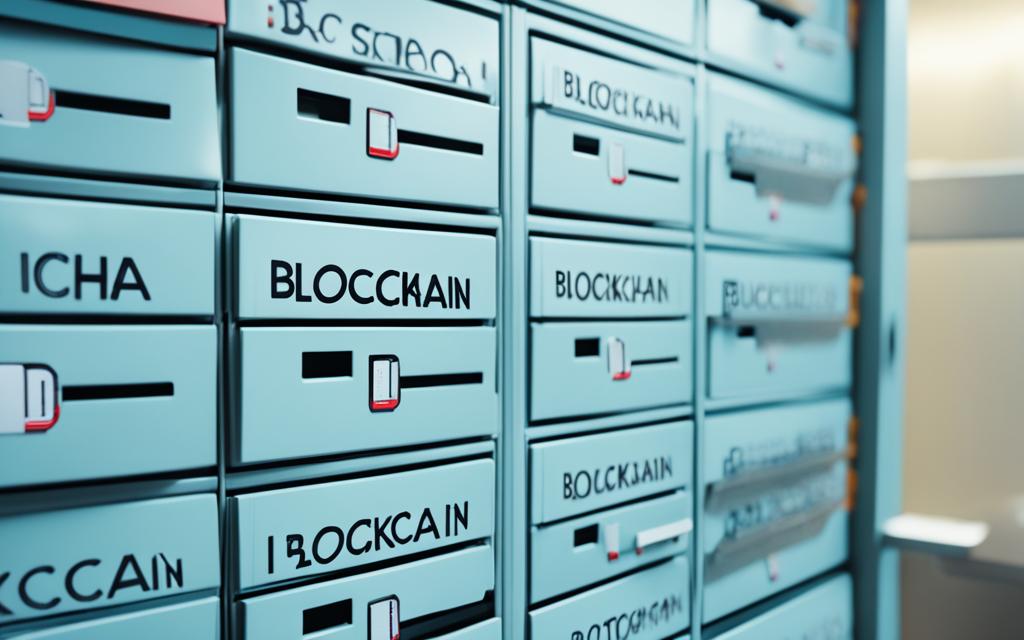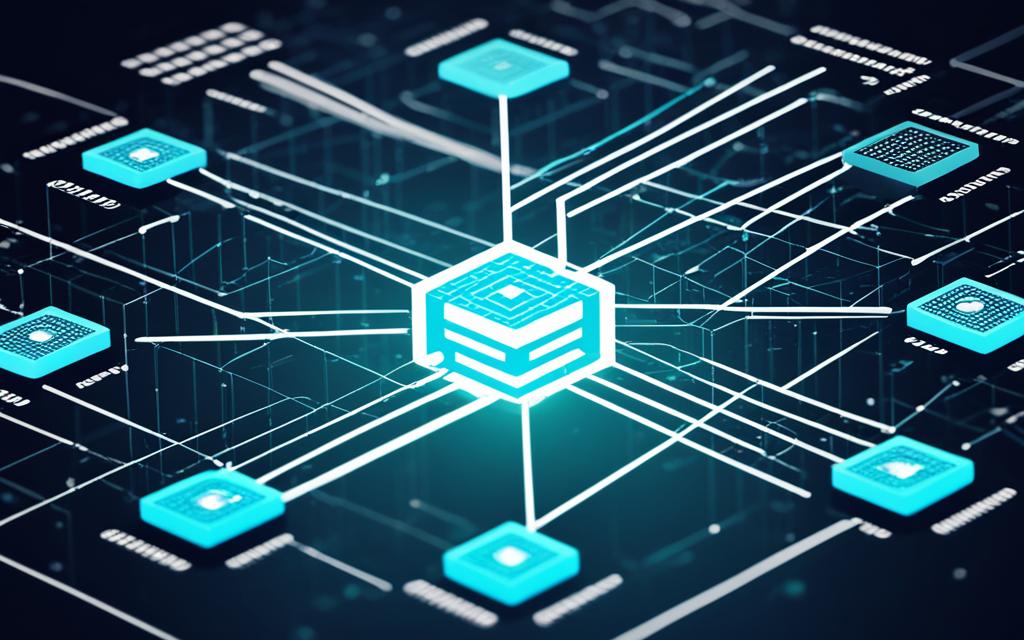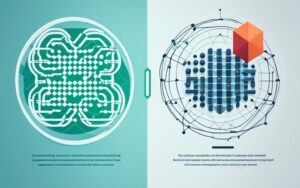Table of Contents
Blockchain solutions are changing how data is handled, unlike traditional methods. They use a decentralized approach and high-security tools, making them different from centralised databases. Blockchain solutions ensure data remains pure and unchanged at all times1. They work by letting users add data but not alter what’s already there, unlike how traditional databases work1.
One big plus of blockchain is it cuts costs by not needing outside record-keeping1. It’s super secure because of its digital ledger blocks, which also cut down on hacking or data mistakes1. Plus, everyone involved in a transaction can see the records, which boosts trust and responsibility1.
On the flip side, normal record-keeping can lead to mistakes or even foul play. Blockchain’s way means data is everywhere safely, protecting it from being lost or tampered with2. Also, getting rid of go-betweens makes things run smoother and cheaper when making sure transactions are right2.
Key Takeaways
- Blockchain solutions provide integrity and transparency at the highest level, ensuring uncorrupted and unaltered data1.
- Conventional record-keeping methods lack the same level of transparency and security provided by blockchain solutions.
- Blockchain reduces costs by eliminating the need for third-party record-keeping services1.
- Blockchain offers enhanced security by storing data in digital ledger blocks, reducing the risk of hacking or errors1.
- Transparency is a key advantage of using blockchain for record-keeping, allowing all involved parties to access transactional data1.
Introduction to Blockchain and Conventional Record Keeping Solutions
Conventional ways of keeping records have been around for a long time. But, things changed with the advent of blockchain. This technology brought a new way to store and manage records. Blockchain is a type of distributed ledger tech that is open and secure. It’s very different from old methods. Let’s dive into the key differences between them.
Conventional ways of recording data are usually centralised. This means all information is under one person or group’s control. But blockchain is different. It spreads the data across a network of computers, each checking and keeping the records. This decentralised system means no single person or organisation decides everything. It makes things fairer and more trustworthy.
One of blockchain’s big strengths is how everyone can see what’s happening. Every transaction is open for anyone to check. This makes the system more reliable and honest. Also, once something is logged, it can’t be changed. This feature boosts the integrity of the data3.
On the flipside, old-style records keeping often directs through one big database. While this might seem easier and cheaper at first, it also opens the door to mistakes and security issues. In contrast, blockchain stops many common problems. It uses special codes and a group of computers to keep the data safe from interference45.
Blockchain also speeds up how businesses do deals. The old ways could take a lot of time and money, needing lots of people to check everything. But with blockchain, deals can happen quicker and cheaper. It takes out middlemen, making things smoother. Plus, the use of smart contracts means less manual work, especially in fields like business, supply chains, and finance53.
So, blockchain and traditional records keeping are really different. While old databases might be cheaper to start off, they come with risks. Blockchain, though, offers a way that’s open, safe, and fast. It changes how we can trust and rely on dealing with data. More companies are using blockchain to improve their records handling.
The Fundamental Differences Between Blockchain and Traditional Record Keeping
The key divide between blockchain and standard record keeping is their use of decentralization. Blockchain runs on a decentralized network of nodes. This setup ensures all transactions are agreed on and verified by many, not just one, source. In comparison, traditional methods of record-keeping have a single authority checking on transactions6. This decentralized nature of blockchain results in more transparency and the protection of data through immutability.
One big plus of using blockchain is the high level of transparency it offers. Every transaction is open for all to see, which builds trust and accountability among members. Anyone involved can check the blockchain to see if the data is correct6. On the other hand, standard databases operate from a central network. This means that not everyone can view or alter the data.
Furthermore, blockchain ensures that once data is recorded, it can’t be changed. By using advanced security techniques like cryptographic hashing and gaining agreement from multiple nodes, blockchain secures information’s accuracy and keeps it safe from edits6. However, traditional databases are more subject to hacking, data changes, or other forms of corruption.
In blockchain, the data is stored in blocks that are chained together in a specific order. This chaining makes sure that the system is secure and trustworthy. But with traditional databases, data is arranged in tables, which don’t offer the same level of security6.
Blockchain’s set-up without a central control and its built-in security features have made it attractive across the board. Sectors like finance, insurance, property, and even gambling are adopting blockchain to make operations smoother, safer, and more open6. Conventional databases, though, are still the go-to for storing information like customer details or business records especially in large scale operations.
Real-World Application Example:
Let’s take a look at how blockchain is shaking up the finance sector. It’s changing the game, offering quicker, safer ways to handle money. In fact, by 2016, over 13% of financial service firms were using blockchain7. And in 2019, 5% of business leaders saw the technology as a major innovation for their companies7. Blockchain’s open and distributed setup is perfect for speeding up global payments and other standard procedures, without giving up on security8. Unlike blockchain, traditional finance databases rely on single points, which can slow down transactions, cost more, and may not be as secure7.
Advantages of Blockchain Over Conventional Record Keeping Solutions
Blockchain technology is changing the way we keep records in our fast-moving digital world. It is a big step forward from old methods. It makes things more secure, clear, and fast while lowering costs.
Enhanced Security and Data Protection
Compared to usual record-keeping, blockchain is much safer. It does this by using complex encryption methods. This keeps all data safe from hacking. Its decentralized nature adds an extra layer of security. This means there is no central target for hackers to attack910.
Transparency and Data Accuracy
With blockchain, everything is more open. Everyone involved can see the same data. This makes sure every transaction is true and easily checked. It also means more trust in the data. Trust is key for making smart decisions910.
Efficiency and Faster Transactions
Transactions are quick with blockchain. It doesn’t need slow, go-betweens because everyone verifies the transactions together. This makes the whole system work faster without any middlemen. Faster deals mean happier customers and smoother operations911.
Cost Reductions
Without extra fees from intermediaries, blockchain can save businesses money. It cuts out the costs of managing third parties. Plus, it lowers the chance of mistakes and fraud. This helps companies save even more by reducing risks and manual work1110.
“Blockchain technology has the potential to revolutionize record keeping, offering enhanced security, transparency, and efficiency while reducing costs. Its impact spans various industries, from finance and healthcare to government and insurance.”
Blockchain is making a big difference. It makes record keeping safer, clearer, and faster. By using blockchain, companies can improve how they keep track of things. This leads to a future where we trust data more and where things work better for everyone.
Disadvantages and Challenges of Implementing Blockchain Solutions
Scalability Issues
Storing more data on blockchain makes handling it all harder. Its secure but slow way of working affects how fast data moves1213.
Integration Complexities
Adding blockchain to old systems isn’t straightforward. It can need big changes to work smoothly together. This includes ensuring everything connects properly, which is no easy task12.
Evolving Regulations
Blockchain laws are always changing. Keeping up with these changes can be tough for companies. They need to adjust and monitor closely to stay legal12.
Lack of Standards and Best Practices
Since blockchain is new, there aren’t set ways to use it. This makes starting with blockchain more difficult and slows how quickly it spreads. Companies have to spend time figuring out their own rules which can be complex12.
Yet, blockchain’s improvements in security, transparency, and record-keeping are very promising121413. By planning well, putting it in place carefully, and checking how it’s doing, companies can make the most of what blockchain offers in the future.
Case Studies: Real-World Applications of Blockchain in Record Keeping
Blockchain technology is changing the game in fields like finance and identity management. It’s also making a big difference in supply chains, healthcare, government work, and education. We’ll take a closer look at how blockchain is being used with real examples. These cover its benefits in different places, making record keeping much better.
-
Finance: Accelerating Record-Keeping Processes
In finance, blockchain makes keeping records faster and safer. It boosts security with its use of cryptography15, making data breaches less likely. Blockchains are faster too, because they cut out the middlemen. This speeds up dealing with money matters. Automation is also a plus with the use of smart contracts in blockchain systems15.
-
Identity Management: Reducing Identity Theft Risks
In the digital world, looking after our digital identity is key. Blockchain helps by making identity management safer15. It lets you store your personal info in a very secure way. This means you have more control over your data. It helps keep your identity safe from fraud.
-
Supply Chain: Ensuring Security and Transparency
Many businesses are turning to blockchain to manage their supply chains. It makes tracking products more secure and visible15. With blockchain, you can see exactly where a product came from. This stops fake items from entering the market.
-
Healthcare: Secure Storage and Access to Medical Records
Blockchain is also helping in healthcare by keeping medical records safe and easy to share. Doctors can keep digital health records securely using blockchain15. It uses special codes to protect patient information. This safe sharing of data means better and less paperwork for patients.
-
Government: Secure Land Registries and Voting Records
Governments are finding blockchain useful for keeping land records and votes safe15. It’s good at keeping our records tamper-proof and clear. By using blockchain, government documents stay honest. This makes voting and land ownership more reliable.
-
Education: Verifying Student Records and Protecting IP
In education, blockchain is changing how we keep records. It helps make sure documents are real, like payment records and transcripts15. It also helps keep new ideas safe. Educational places use it to protect their inventions and writings. This keeps important work from being copied or stolen.

Across many sectors, blockchain is proving its worth in saving and sharing data. Whether it’s managing money, learning, or tracking products, its benefits are clear. It makes everything more secure, open, and smooth. The way records are kept is being upgraded, thanks to blockchain tech.
The Future of Record Keeping: Blockchain vs. Conventional Methods
Looking ahead, one technology is really standing out: blockchain16. It has lots of benefits over traditional ways. For example, it offers better data integrity, real-time updates, and more security16.
Introduced in 2008, blockchain has truly changed the game16. It makes sure records can’t be changed or deleted. This makes the data safe and hard for bad actors to interfere with16.
Blockchain is spread across many points, not just one central place16. This makes it tough for attacks to bring it down. Adding special codes to check transactions also boosts security against hackers16.
Efficiency and Cost-effectiveness
Blockchain is not just safer, it’s also more efficient16. It doesn’t need people to check each transaction. This cuts down on mistakes and the need for middlemen, saving money in the end16.
Initial costs might be higher for blockchain, but it’s cheaper later on16. This is because it needs less human work and fewer middle people. Better efficiency adds to the savings16.
Challenges and Adoption
But, using blockchain for record keeping is not without problems. One issue is fitting all the transactions as the system grows. This can slow things down16.
There’s also the uncertainty about rules and laws with this new tech16. Sorting out legal matters is tough and can slow down how fast blockchain spreads16.
The best move might be to use both blockchain and traditional systems16. This way, places get the best of both. Blockchain’s great for quick updates, secure data, and clear action tracking16.
The Way Forward
Blockchain has a big role to play in record keeping’s future. But, it needs to tackle its issues first. It takes a mix of law, economics, and more to make blockchain better17.
Working together, the academic and business worlds can make blockchain work well in record keeping17. Sharing what we know can improve blockchain. This helps many fields use it better17.
We’re heading towards more blockchain in record keeping. It offers better data, quick updates, and keeps things safe16. Overcoming its challenges brings many benefits for keeping records a new way16.
Security and Trust in Blockchain Record Keeping
Keeping records safely and being trusted is very important. Blockchain technology uses powerful security to keep data safe and build trust. It uses tools like cryptographic hashing and a network where no single point controls everything. This way, it protects against changes or hacking attempts18.
Blockchain makes sure data stays unchanged using cryptographic hashing. It creates a unique code for each piece of data. If someone tries to change the data, this code will show it’s been tampered with18. That’s how blockchain keeps records so secure, by making any sneak tweaks very obvious19.
The fact that blockchain is not controlled by a single place makes it more secure. Everyone using blockchain has a copy of all its data. This stops any one person or group from controlling everything. It’s different from traditional systems. If they fail, everything might get compromised. With blockchain, this risk is much lower18.
A special type of secret code, called public-key cryptography, also helps make blockchain secure. It lets people talk safely over the network without needing a middleman. This means private data is kept safe while being sent over the blockchain18.
The way that blockchain checks and adds transactions to its records is also very secure. The methods it uses make sure everything’s done in an honest way. This stops fraudulent acts and helps build trust among all users19.
This high level of security has made blockchain a top choice for many uses. For example, IBM Food Trust tracks where food comes from, ensuring its safety. In finance, INBLOCK uses blockchain to make dealing with cryptocurrencies safer18. The IBM Blockchain Platform helps keep health records secure. And in the oil and gas industry, blockchain is stopping problems in the supply chain. Even The Home Depot uses it to share trusted data about products with suppliers18.
To sum up, blockchain technology changes the game in keeping records safe and trustworthy. It uses special coding, a network without a single boss, and checks to make sure everything is correct. Its real uses show the big impact it’s making across many fields. It’s shaping the future of how we trust and rely on digital information18.
Conclusion
Blockchain solutions have changed how we keep records by making them more secure and transparent. They work in a special way that prevents anyone from changing or deleting transactions. This means that unlike traditional methods, blockchain keeps our data safe even if something goes wrong.
Blockchains also use smart contracts to do deals without middlemen. This makes transactions quicker and more straightforward. The technology’s key strengths are its clarity and being unchangeable, which help in activities like tracking items, looking after people’s health, and managing money.
But, blockchain has its own set of problems, like fitting to larger tasks and using a lot of energy. People are working hard to make it better. Still, it’s likely to become more popular because it’s a safer and more efficient way to handle information in the digital world.
FAQ
What are the main differences between blockchain solutions and conventional record keeping?
Blockchain solutions change how we keep records by focusing on trust and openness. They use a network of computers, each checking the others, and strong codes to protect information. In contrast, usual ways of keeping records put all the control in one place.
How does blockchain differ from traditional record keeping?
Blockchain is based on shared records that are kept by many, not just one, body. It’s like thousands of voices agreeing on the same story. Traditional ways rely on one person or group telling the story alone.
What is the fundamental difference between blockchain and traditional record keeping?
The key difference is where the power lies. In blockchain, many different people or groups share the responsibility. This ‘sharing’ is supposed to make the system more trustworthy. But in traditional record keeping, one person or a single group is in charge instead.
What advantages does blockchain offer over conventional record keeping?
Blockchain makes things more secure, clearer, speeds up business, and costs less than usual methods. It doesn’t need go-betweens and cuts down on mistakes. This can change how we do many things for the better.
What challenges are associated with implementing blockchain solutions?
Using blockchain can run into problems as more and more data is added. Making it work with what we already have can be tricky. Add changing rules and the fact that everyone does it differently, and it can get kind of messy.
Where can blockchain technology be applied in record keeping?
Blockchain can work in fields like money, checking who we are, delivering things, keeping us healthy, in government, and schools. It offers trust and clear tracks in all these areas.
What does the future hold for record keeping with blockchain?
The future could see a big change in how we record facts. Blockchain might make things quicker, more honest, and more trustworthy next to old ways.
How does blockchain ensure security and trust in record keeping?
To keep data safe, blockchain uses special codes, spreads the load between many machines, and has rules everyone follows. This approach makes cheating pretty hard, meaning we can trust the details more.
Source Links
- https://www.theknowledgeacademy.com/blog/what-sets-blockchain-solutions-apart-from-conventional-record-keeping-solutions/ – What Sets Blockchain Solutions Apart From Conventional Record-Keeping?
- https://cryptonews.net/news/blockchain/21134091/ – What Sets Blockchain Solutions Apart from Conventional Record-Keeping Solutions?
- https://medium.com/@BlockchainReporter/what-sets-blockchain-solutions-apart-from-conventional-record-keeping-solutions-c0b19be11d09 – What Sets Blockchain Solutions Apart from Conventional Record-Keeping Solutions?
- https://www.byzgen.com/insights/what-sets-blockchain-solutions-apart-from-other-record-keeping-solutions – Blockchain versus conventional record keeping solutions
- https://www.cryptobunq.com/blog/conventional-vs-blockchain-solutions – Blog: Record-Keeping: Conventional vs. Blockchain Solutions
- https://www.scalingparrots.com/en/blockchain-vs-database-what-is-it/ – Blockchain Vs. Database: which is better?
- https://en.wikipedia.org/wiki/Blockchain – Blockchain
- https://www.techtarget.com/searchcio/definition/distributed-ledger – What is distributed ledger technology (DLT)? | Definition from TechTarget
- https://cryptobites.cc/what-sets-blockchain-solutions-apart-from-conventional-record-keeping-solutions/ – What Sets Blockchain Solutions Apart From Conventional Record Keeping Solutions
- https://blog.renesistech.com/what-sets-blockchain-solutions-apart-from-conventional-record-keeping-solutions/ – What sets blockchain solutions apart from conventional record-keeping solutions?
- https://www.ibm.com/topics/benefits-of-blockchain – What are the Benefits of Blockchain? | IBM
- https://www.appmaisters.com/blockchain-solutions-apart-from-conventional-record-keeping/ – Blockchain Solution: What Sets Them Apart from Conventional Soln
- https://www.forbes.com/sites/forbestechcouncil/2022/10/20/advantages-and-disadvantages-of-blockchain-technology/ – Council Post: Advantages And Disadvantages Of Blockchain Technology
- https://www.smartsight.in/technology/what-sets-blockchain-solutions-apart-from-conventional-record-keeping-solutions/ – What Sets Blockchain Solutions Apart From Conventional…
- https://coin360.com/news/blockchain-vs-conventional-record-keeping – Blockchain vs Conventional Record-Keeping: A Comparison
- https://medium.com/@reblotheone/blockchain-vs-conventional-record-keeping-key-differences-42f9e17902e2 – Blockchain vs. Conventional Record-Keeping: Key Differences.
- https://blogs.ubc.ca/recordsinthechain/files/2018/06/FinalReport_Volume1.pdf – PDF
- https://www.ibm.com/topics/blockchain – What Is Blockchain? | IBM
- https://www.investopedia.com/terms/b/blockchain.asp – Blockchain Facts: What Is It, How It Works, and How It Can Be Used








